
| The following reviews of new and classic genre
movies, television series or tv-movies, books and magazines,
comic books and graphic novels, video and dvd releases, cds and
cd-roms, and internet sites, were written by members of this
club during the years 2003 to present. If you are a member of
Star Base Andromeda and would like to submit a review for consideration
for this website, please contact us at the club's official
e-mail account. Opinions expressed in the reviews on this
website are solely those of the individual reviewer, and do not
reflect the views of the membership of Star Base Andromeda as
an organization. |
|
|
|
|
-- reviewed by Scott Clark |
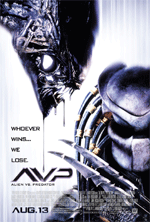 *** THIS
REVIEW DOES NOT CONTAIN SPOILERS *** *** THIS
REVIEW DOES NOT CONTAIN SPOILERS ***Alien vs. Predator [2004] Alien --
4 1/2 Now, with that out of the way, my opinion about the new film. I'll be honest. I thought it was only an "okay" action scifi film. It's far more successful as a Predator film than it is as a film in the Aliens saga, but it's far from perfect in either category. Alien vs. Predator has several excellent set pieces, some truly thrilling action sequences, and a handful of characters worth watching, but on the whole it just feels like a bunch of battle scenes or cheap thrills tied together by a threadbare plot. The cast is full of complete unknowns, with the exception of Lance Henriksen as Charles Bishop Weyland, the rich industrialist who finances an emergency mission to explore a newly discovered energy source buried beneath the Antarctic ice surface. The plot needs of the film preclude and real character growth, even on the part of the female lead, Sanaa Lathan as Alexa Woods, an experienced mountaineer and ice climber hired to lead the expedition. As the body count escalates throughout the film, with humans caught between a trio of Predators and a growing army of the reptilian Aliens, I found that I couldn't bring myself to care about any of the human characters. Which left me studying the two alien species as the source of my enjoyment of the film. The concept of an ancient underground pyramid being used as an Alien game preserve by Predators didn't seem like an outlandish concept to me. But neither of the species really comes across well in this film. The filmmakers fall victim to the axiom about real bad-ass characters losing their, um, bad-assedness when there's too many of them. The Aliens, even an Alien Queen brought out of deep hibernation, seem particularly ineffective in this film. Meanwhile, the production designers made the bizarre choice to change the physical size of both the Predators, who now seem nearly 9 to 10 feet fall, and the Aliens, making this film not jibe with the previous films in either series. The visual effects are excellent, although publicity about the film since its release indicates that many fx-related shots were not finished in time for the film's release and were simply cut. The set design was great, and the film will definitely look better on the big screen than on the television screen. But, all in all, with cardboard characters and an overload of action, this is more a piece of eye candy than serious filmmaking, and is bound to upset purists fans of either of the competing franchises. I enjoyed Alien vs. Predator mildly, but can't work up too much enthusiasm for recommending it. |
|
-- posted 0408.26 |
|
|
-- reviewed by Brian Hirt |
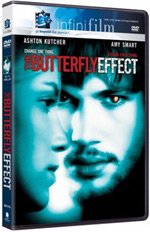 ***
THIS REVIEW DOES NOT CONTAIN SPOILERS *** ***
THIS REVIEW DOES NOT CONTAIN SPOILERS ***The Butterfly Effect [2004] So, leaving all anti-Ashton prejudices at the door, and moving on to the tale, we are presented with the "big" idea: what if you could change one small detail in the past -- how would it impact the present? The concept was clever and exciting half a century ago when it was fresh (Bradbury's 1952 short story "A Sound of Thunder" is the seminal example), deliciously skewered by the Simpsons in "Tree House of Horror V", and was even enjoyable in a warm, familiar way the zillionth time around as recently as the 2000 film Frequency. With a premise so old and comfortable, then, the story must succeed or fail in the details. This time around the block we are given Evan Treborn (Kutcher), our hero with a scar-filled past and a newfound ability in his adulthood to make changes to that past. Orbiting his adult universe, in varying paths as their fortunes change with each revision to history, are the usual suspects from his childhood: first love Kayleigh, her loose-cannon brother Tommy, desperate-to-belong fat kid Lenny, and don't forget dear old mom. Given the setup, then, this movie becomes a game for experienced viewers who will doubtless take part in guessing... - how each "fix" to the past will screw up the present As these questions are inexorably answered in the film, it actually manages to come up with a few unexpected and enjoyable twists along the way (not to be revealed here!). Doubtless some will point out plot holes of the gaping variety, but that's about as productive as quibbling about the atomic weight of dilithium -- once you accept non-scientific time travel in a story, all rights to nitpick on the topic are forfeit. Finally, for those who aren't totally satisfied with The Butterfly Effect, take heart that it will surely be remade (in concept) someday soon. Nothing, it seems, can be done to change that. A few notes... - Does being given the name "Lenny" destine a baby
boy into becoming a desperate-to-belong fat kid? Would naming
the same boy "Ace" or "Duke" save him from
this fate? |
|
-- posted 0409.08 |
|
|
-- reviewed by Scott Clark |
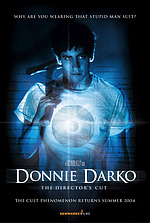 ***
THIS REVIEW CONTAINS SPOILERS *** ***
THIS REVIEW CONTAINS SPOILERS ***Donnie Darko: The Director's Cut [Date] Donnie Darko (The Director's Cut) is a...fascinating...film. I'm not sure if I can describe it any more effectively than that. Walking out of the theater, I thought the film was a muddled mess, full of disjointed images and unconnected themes and ideas. In the days since watching the film, though, I can't stop thinking about it, and it makes more sense and has more resonance now than when I originally watched it. This debut effort from writer/director Richard Kelly is a mixture of crude teen comedy, angsty drama, horror, surreal mind trip, science fiction, and philosophy. My biggest problem with the film is that it tries to be too many things to too many people. Jake Gyllenhaal stars as Donnie Darko, a troubled, schizophrenic, heavily-medicated teenager in a typical suburban family in the fall of 1988. Donnie, compelled beyond reason to leave his home at night and find himself in other neighborhoods when he awakens in the morning, begins to be haunted by images of a demonic 6' rabbit named Frank, who convinces Donnie to be out of his home on the night that a jet engine falls from the sky and destroys his bedroom. Frank tells Donnie that the world will end in 28 days, and then convinces Donnie to engage in acts of escalating vandalism and violence. Becoming more and more alienated from the world around him, Donnie's only anchor to reality is his girlfriend, Gretchen, the new girl in town. As Donnie becomes obsessed with trying to discover what Frank is hiding from him, while still feeling compelled to act on Frank's increasingly bizarre suggestions, he begins to piece together an explanation for all the insanity that stems from a time-travel sub-plot. In an emotional and crushingly powerful final 15 minutes, filled with moments of horrible loss, shock and acceptance, Donnie makes a fateful decision about how to "fix" his broken world. The performances in this film are uniformly excellent. Gyllenhaal is the centerpiece, and he brings an amazing combination of innocence, creepiness, powerlessness and desperation to the role of Donnie. The other members of his family, particularly Holmes Osborne as his father, Mary McDonnell as his mother, and Maggie Gyllenhaal as his sister, are absolutely perfect, as is Gena Malone as Gretchen. Other supporting characters -- the liberal English teacher crushed by a conservative school system (Drew Barrymore), the caring yet cautious science teacher (Noah Wyle) and the sicko motivational speaker (Patrick Swayze) all hit their marks spot on. The one role that grated on me was the incredibly stereotyped gym teacher (played by Beth Grant) whose conservative campaign sets in motion a chain of negative events. Otherwise, the characters all seemed pretty realistic and were all well-done. The soundtrack to the Director's Cut was beautiful, particularly the wrenching use of Gary Jules' take on Tears For Fears' "Mad World" in the final montage of the film. I am still haunted by the images of all the characters coming to terms with their fates. The directing, editing, cinematography, special effects and all other aspects of Donnie Darko are quite good. I have no idea what changes have been made from the original in order to release this Director's Cut, but I'm curious to watch the original to find out. In the end, I would have to say that Donnie Darko (The Director's Cut) is a compelling, confusing, and ultimately thought-provoking film, with an ultimate message about the power of personal sacrifice. I do recommend the film, and I look forward to seeing it again myself to find out if I gain new understanding into Kelly's cinematic vision, or whether I'm giving too much credit to the film. An official website exists for the film at www.donniedarko.com. |
|
-- posted 0410.06 |
|
|
-- reviewed by Brian Hirt |
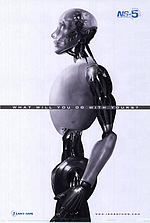 ***
THIS REVIEW DOES NOT CONTAIN SPOILERS *** ***
THIS REVIEW DOES NOT CONTAIN SPOILERS ***I, Robot [2004] Without much regard to the source, then, I, Robot is both fun and interesting as a popcorn movie. Set in a near-future Chicago, it presents a world in which sentient robots are integrated into society, to the consternation of city homicide detective Del Spooner (Will Smith), who has his reasons for fearing the trust in which society has placed the ubiquitous robots. Despite the machines' supposed inability to harm humans (hard-wired into their "positronic" brains), the dubious suicide of a leading roboticist fuels Spooner's suspicions that these friendly servants-to-humanity are not what they appear. Fights, vehicle chases, and acts of deceit and courage ensue. Those who enjoy easy-to-digest science fiction and action will find their expectations met for a big-budget summer movie; additional plot details would serve no greater purpose here. Among the cast of characters, it is noteworthy that the strongest performance is turned in by computer-rendered Sonny, a robot suspected of committing an act that should be impossible given his programming. Voiced with care and nuance by Alan Tudyk (of the short-lived television series Firefly), Sonny comes across as the most complex, best drawn, and perhaps most "human" character in the film. Conversely, Spooner's smart-alecky one-liners could have been written by some artificial intelligence in Hollywood programmed to deliver cheap laughs. Is there no room for a Will Smith performance that falls somewhere between Men in Black and Six Degrees of Separation? When it isn't playing for yuks, though, the movie is successful from start to finish and will be enjoyed by most science fiction fans. Remaining purists are urged to pretend the film was titled Robot Movie 2004, sit back and enjoy, and not give themselves undue indigestion. |
|
-- posted 0408.26 |
|
|
-- reviewed by Scott Clark |
 ***
THIS REVIEW DOES NOT CONTAIN SPOILERS *** ***
THIS REVIEW DOES NOT CONTAIN SPOILERS ***I, Robot [2004] Why, then, would I have even bothered to go to I, Robot? Simple -- I thought I'd give it a chance. The original short story collection really didn't seem like a candidate for a direct adaptation. The stories are only loosely connected, are separated by noticeable gaps in time, and feature mainly talking heads. Still, Harlan Ellison did a remarkable job adapting them into an unproduced screenplay 20 years ago. Maybe somebody else was able to put a worthwhile spin on the stories as well. I'm sorry to say, but as an adaptation of Isaac's stories, this movie is a failure. Despite the repeated reiterations on-screen of Asimov's Three Laws of Robotics, and the appearance of a few character names, this film bares very little resemblance to the tone and intent of the short story collection. In fact, in my opinion, even the use of the Three Laws is poorly handled, as the robots' behavior in this film (with the possible exception of Sonny) flies in the face of those Three Laws. As a summertime action scifi flick, I, Robot fares slightly better. The performances ranged from typical (Will Smith's trademark smart aleck) to disappointingly bland (Bridget Moynihan as a stereotypical science nerd) to solid (but woefully underused) supporting players in Bruce Greenwood and James Cromwell. Surprisingly, the best performance in the film is that of the special effects team (with the voice work of Alan Tudyk) as the self-aware NS5 robot, "Sonny". By the end of the film, I cared far more for the fate of Sonny than for any of the human characters, and that's a major accomplishment in a film that eschews Asimov's hopeful, pro-technology views for a colder, more cautionary tone. While the special effects were at times impressive, they were also at times laughable. The filmmakers obviously bought into the "more is better" mind-set, and instead of bringing in stronger character development and/or additional humanizing scenes they bombard the audience with major action pieces mercilessly. The whole "attack of the robots against Spooner in the tunnels" sequence just became tiresome. Same for the climactic battle to inject the computer core at the end of the film. On the other hand, the film has lots of nice, little touches that almost make up for the excesses. The one thing I couldn't get past, though, was the fact that the setting was supposed to be only 35 years from now. The technological leaps to get from here to there seem like more than 35 years to me. Oh, yeah, and the product placements were blatantly annoying. All in all, I left the theater feeling only moderately entertained, yet astonished at how much I ultimately cared for Sonny and what his future holds. As an adaptation of the original source stories, I, Robot barely deserves a 1, while as a mindless summer action film it might eke out a 4. I'll split the difference. |
|
-- posted 0408.26 |
|
|
-- reviewed by David Teche |
 ***
THIS REVIEW DOES NOT CONTAIN SPOILERS *** ***
THIS REVIEW DOES NOT CONTAIN SPOILERS ***I, Robot [2004] The movie probably starts somewhere in the middle of the Asimov time line, presenting a world that looks as we recognize it today, with a decided Star Wars feel to it, what with all the robots about. As the story unfolds on screen, one wonders where Will Smith has acquired his distaste for robots. Thankfully, this is a question answered very well later in the movie. What appears to be a murder investigation takes first class twists and turns throughout the story. As with any good mystery, the viewer does not have enough information to figure out what has transpired, but enough compelling detail to stay riveted to the screen. The visual effects of the movie are integral but not overpowering or distracting and they flesh out a world that seems far more distant than 35 years from present day. The visible technology is believable, for me largely because there was no effort to explain it, an attempt that would surely have dispelled the magic. Toward the end of the movie, the story starts to come to a point unexpected, given the prior path. And while some may object to the deviation from the original work, I found the conclusion to be refreshing, logical, and in keeping with Asimov's three laws of robotics. If there were any flaws to the movie, I would have to say that most of them revolved around Will Smith. His portrayal was most often two-dimensional and a review of his characters in Men in Black and Independence Day. This was nicely offset by the performance of Bridget Moynihan, the steely scientist, who is a dead ringer for the Dr. Susan Calvin in Asimov's original work. And regardless of what visual method was used to pull it off, the NS5 robot "Sonny" was everything a viewer would expect in the context of the story, right to the very end. While I would not say the film is stunning, it certainly has merit, and is, for me, just over two hours well spent. On a scale of zero to five, I would have to give I, Robot a solid 4. |
|
-- posted 0408.26 |
|
|
-- reviewed by Terri Dreier |
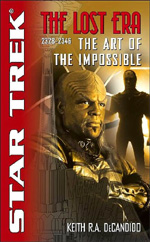
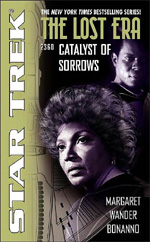 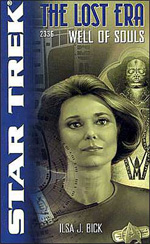 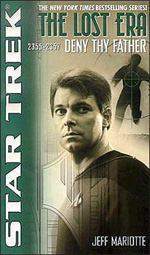 The Lost Era -- Star Trek Books
|
|
-- posted 0507.26 |
|
|
-- reviewed by Scott Clark |
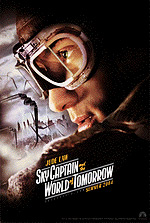 ***
THIS REVIEW DOES NOT CONTAIN SPOILERS *** ***
THIS REVIEW DOES NOT CONTAIN SPOILERS ***Sky Captain and the World of Tomorrow [2004] Bold and stylish in its production design and innovative in its special effects work, Sky Captain is a mixture of exciting adventure, tongue-in-cheek storytelling, and big ideas. Starring Jude Law as Joe "Sky Captain" Sullivan of the famous Flying Legion of adventurers, Gwyneth Paltrow as intrepid reporter Polly Perkins, Giovanni Ribisi as Dex Dearborn (Sky Captain's trusty scientific genius and pulp-magazine afficianado) and Angelina Jolie as the crusty Franky Cook (a distaff 'Nick Fury'), Sky Captain is admittedly long on looks and short on story. But...oh, what looks they are! From the very first scene, filmmakers Kerry (writer/director) and Kevin (production designer) Conran throw the audience into another era -- that of the B-movies of the 1930s and 1940s, if B-movie producers were given unlimited budgets to match their unlimited imaginations. From early sequences of giant flying robots attacking Manhattan, to astounding acrobatics of Sky Captain's dogfights against bat-wing flying machines in his modified P-40 Warhawk, to explorations of both frozen and tropical landscapes, the visuals of this film are gorgeous, suffused with a glowing ambiance that makes the film feel like a displaced artifact from years gone by. The effects, done completely by computer, are uniformly good...without the occasional piece that sticks out as either much better than or much worse than the rest. The musical soundtrack, reminiscent of John Williams' work, is beautiful...full, orchestral and heroic. The performances from the main and supporting cast are all quite good, considering that each character is a loving recreation of stereotypical types from classic films -- the square-jawed hero, the spunky sidekick, the enthusiastic young reporter, the mysterious military officer, etc. Nobody plays their part over the top, and in fact one minor quibble might be that the actors could have invested more into their parts -- a complaint I've heard from several folks. However, more depth to the characters might have made them more than this film demanded. My only complaints about Sky Captain and the World of Tomorrow are minor technical details, that put me in nit-picking territory. Things such as referring to World War I when there hasn't been a second World War, or inconsistencies in timelines. Many of the problems I had could've been addressed with minor dialogue variations or throwaway lines -- explaining timeline differences considering that the world of Sky Captain is obviously an alternate reality to our own. All in all though, I left the theater feeling fully entertained, and looking forward to seeing this film again sometime soon. I strongly recommend this one. In much the same way as I enjoyed The Adventures of Buckaroo Banzai twenty years ago, Sky Captain and the World of Tomorrow manages to create its own original cinematic reality, with impressive visuals and a cheeky, engaging story. Both films tackle plots that could easily have been played up for laughs, but instead are handled with total seriousness. Sky Captain deserves kudos for all that it brings to the screen. Not to mention the twist of who plays the arch-villain Totenkopf! |
|
-- posted 0409.26 |
|
|
-- reviewed by Scott Clark |
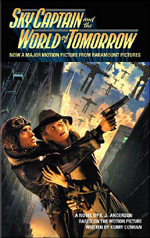 ***
THIS REVIEW DOES NOT CONTAIN SPOILERS *** ***
THIS REVIEW DOES NOT CONTAIN SPOILERS ***Sky Captain and the World of Tomorrow I picked up this novelization of Sky Captain and the World of Tomorrow in the hopes that the author adapting it to print form would be able to fill in a few of the background details that the film either didn't cover or merely glossed over. Seing the author's name -- K.J. Anderson -- I presumed this was actually Kevin J. Anderson, who, in addition to his original fiction, has also written some very entertaining Star Wars and X-Files novels and who has done a few previous movie novelizations in the past as well. I'm sorry to say, but in my opinion this book turned out to be an almost complete waste of time and paper. The only reason it's not getting a "bomb" rating by me is that this novelization does, indeed, include a few plot and background details that didn't make it onto the screen with the film. There are also some different bits of dialogue, including repeated references to "The Great War," instead of the use of the term "World War I," as was done with great awkwardness in the movie. On the whole, however, the writing quality of the Sky Captain novelization is incredibly amateurish -- I felt like I was reading fan fiction written by a junior-high student. This book was humorless, had no energy, no flow, extremely limited descriptive text and only paper-thin characterization. For someone who enjoyed the movie tremendously, this book was a major disappointment. I can't even recommend this one for Sky Captain completists. Instead of spending $6.99 on this bland work, just go see the movie again!  |
|
-- posted 0409.26 |
|
| Last updated on 11-21-2008 |